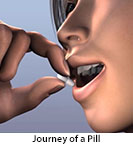
ADHD Medicines
What are ADHD medicines used for?
Children with Attention Deficit Hyperactivity Disorder (ADHD) have problems paying attention (inattentive), being unable to sit still (hyperactive), and doing things without thinking first (impulsive). There are medicines that help treat the symptoms of ADHD.
Most ADHD medicines work quickly, so you'll know within a few days if it will help your child. The dosage may need to be adjusted by your child’s healthcare provider. Benefits of this medicine often include:
- Less trouble finishing classwork and homework
- Less fidgeting or squirming
- Better control of emotions
- Less impatience and impulsiveness
- Better relationship with teachers, family, and friends
- Increased self-esteem
Some children may become more active in the evening after the medicine has worn off. Some children with ADHD do well using behavior training methods, and may not need a medicine. There is no cure for ADHD, though medicine can help manage some of the symptoms.
How does it work?
Most ADHD medicines are stimulants. Researchers think the area of the brain that controls focus and attention is underactive and works poorly in children with ADHD. The medicine stimulates those areas of the brain so that the child can better pay attention and focus on activities.
What else do I need to know about this medicine?
- This medicine has been linked to sudden death in children and teens with heart defects or other heart problems. Your provider may test your child for heart disease before your child takes this medicine. Talk with your provider about the risks and benefits.
- Follow the directions that come with your child’s medicine, including information about food or alcohol. Make sure you know how and when your child needs to take the medicine. Your child should not take more or less than he or she is supposed to take.
- Try to get all of your child’s prescriptions filled at the same place. Your pharmacist can help make sure that all of your child’s medicines are safe to take together.
- Keep a list of your child’s medicines with you. List all of the prescription medicines, nonprescription medicines, supplements, natural remedies, and vitamins that your child takes. Tell all healthcare providers who treat your child about all of the products your child takes.
- Many medicines have side effects. A side effect is a symptom or problem that is caused by the medicine. Ask your healthcare provider or pharmacist what side effects the medicine may cause and what you should do if your child has side effects.
If you have any questions, ask your healthcare provider or pharmacist for more information. Be sure to keep all appointments for provider visits or tests.
Last modified: 2017-04-11
Last reviewed: 2017-04-11


